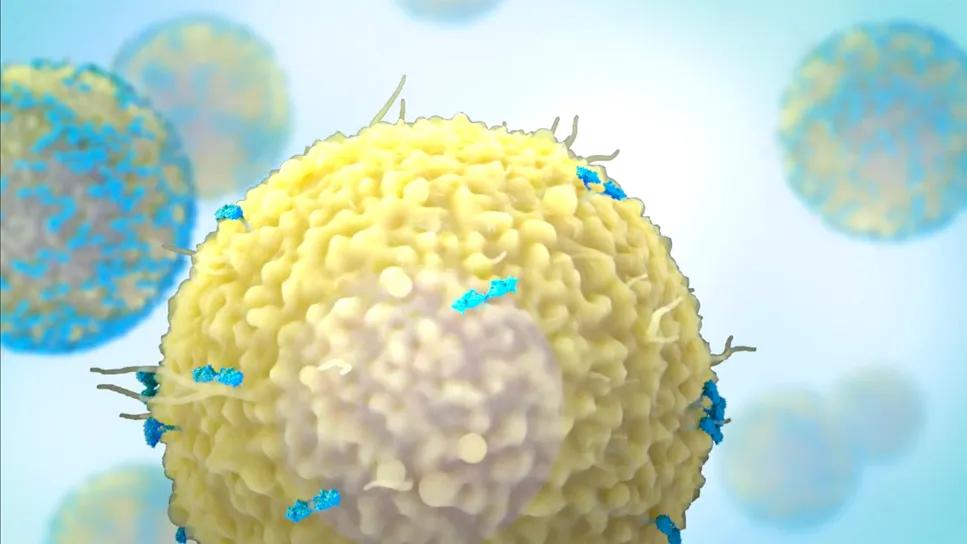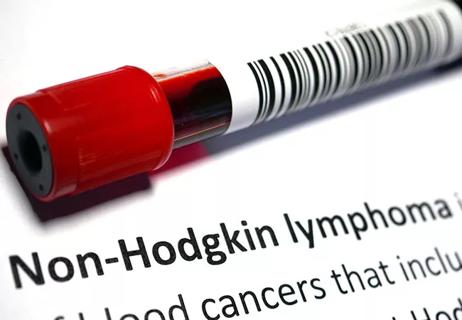Patients who relapse early after first-line chemotherapy are often, but not always, refractory to second-line chemotherapy

A high proportion of patients with diffuse large B-cell lymphoma (DLBCL) who relapse within 12 months of completing second-line therapy with R-ICE (rituximab, ifosfamide, carboplatin and etoposide) have chemorefractory disease. However, a subgroup of patients who relapse after initial chemotherapy, whether early or late, do respond to second-line R-ICE, especially if they proceed to autologous stem cell transplant, according to findings from a retrospective multicenter review of nearly 300 patients.
Advertisement
Cleveland Clinic is a non-profit academic medical center. Advertising on our site helps support our mission. We do not endorse non-Cleveland Clinic products or services. Policy
Early failure after initial R-CHOP (rituximab plus cyclophosphamide, doxorubicin, vincristine and prednisone) chemotherapy is considered a surrogate for poor likelihood of response to second-line R-ICE in DLBCL. For the population of patients who relapse early after R-CHOP, and are thus labeled as chemorefractory, chimeric antigen receptor T-cell (CAR-T) therapy has been recently demonstrated to have event-free survival benefit over standard of care chemoimmunotherapy. However, many patients still receive chemoimmunotherapy, either because of rapidly progressive disease that cannot wait for CAR-T cell manufacture or because of other access issues.
Led by Paolo F. Caimi, MD, study co-author and staff oncologist at the Cleveland Clinic Taussig Cancer Institute, investigators examined the medical records of 291 patients with relapsed/refractory DLBCL who were treated with R-ICE as second-line therapy at three academic medical centers (Cleveland Clinic, Case Western University, Cleveland and Washington University, St. Louis) between 2010 and 2020. Relapsed/refractory DLBCL was defined as disease that was refractory within 12 months of the end of initial R-CHOP therapy. Dr. Caimi presented the data at the 2022 annual meeting of the American Society of Hematology in New Orleans.
“The main finding was that a large proportion of patients who relapse do so early,” says Dr. Caimi. “Two thirds who relapse after initial therapy will do so within 12 months of completed treatment. That is the group of patients for whom CAR-T cell therapies are approved.”
Advertisement
After a median follow up of 53 months, the median progression-free survival (PFS) after treatment with R-ICE for all patients who had refractory disease or who relapsed early after first-line therapy was six months, compared with 31 months in those who relapsed after 12 months of initial therapy, for a hazard ratio (HR) of 1.84 (P<0.0001). The four-year estimates of PFS were 24% in patients who relapsed early versus 40% in the patients who relapsed late.
Median overall survival (OS) was similarly lower in patients who relapsed early versus those who relapsed late, at 36 months versus 68 months, respectively (HR, 1.63; P=0.009), with four-year overall estimates of 48% versus 66%, respectively.
“Once patients are treated with R-ICE, a larger proportion of those who had early relapse did not respond to R-ICE , whereas if the patient relapses more than 12 months after R-CHOP, they have a higher chance of responding,” says Dr. Caimi. “Only a few of the patients who relapsed late had stable disease or progressive disease.”
Among patients who achieved a complete response after R-ICE, the median PFS was 43 months for those who relapsed early and was not reached for those who relapsed late (HR=1.43; P =0.2), with four-year PFS estimates of 43% and 50%, respectively. Median OS for patients in remission after R-ICE was 85 months versus 102 months for those who relapsed early versus those who relapsed late (HR = 0.98; P > 0.9), with four-year OS estimates of 69% and 72%, respectively.
Time from previous therapy to relapse is commonly used as a surrogate for chemosensitivity. “It does mean that patients are more likely to respond to chemotherapy if they relapse late,” Dr. Caimi says. “However, about one third of patients who relapsed early after R-CHOP still had a complete response to chemotherapy.” Among patients who achieved a complete response after R-ICE, the median PFS was 43 months for those who relapsed early and was not reached for those who relapsed late (HR=1.43; P =0.2), with four-year PFS estimates of 43% and 50%, respectively. Median OS for patients in complete remission after R-ICE was 85 months versus 102 months for those who relapsed early versus those who relapsed late (HR = 0.98; P > 0.9), with four-year OS estimates of 69% and 72%, respectively.
Advertisement
Further analysis of the outcomes of patients who achieved a complete response after R-ICE and then went to autologous stem cell transplant showed that the median PFS was approximately 50% at four years, which for patients with early relapsed disease after first-line therapy is a relatively positive outcome. Patients who underwent autologous stem cell transplant after achieving a complete response had median PFS of 71 months, while median OS was not reached.
One challenge, Dr. Caimi says, is how to identify those patients with early relapsed disease who will be chemosensitive. Patients who relapse early for whom CAR-T cell therapy has been validated in clinical trials are automatically considered chemorefractory, but a subset of the patients may have experienced good long-term outcomes with another course of chemotherapy followed by a stem cell transplant.
The second question is whether patients in complete remission after R-ICE could have additional benefit by receiving CAR-T cells instead of transplant, however, there are no data regarding this. “We could be potentially not offering an effective treatment to chemosensitive patients because we are pooling them all together in our treatment algorithms,” Dr. Caimi says. “Our results show that if a complete remission is achieved with R-ICE, we should consider the patient for an autologous transplant. Future trials will be needed to answer whether CAR-T cells can achieve additional benefits for this group of patients”.
Advertisement
Advertisement

Addressing rare disease and challenging treatment course in an active young patient

Study measures real-world outcomes for relapsed or refractory large B-cell lymphoma

Optimized responses in transplant- and CAR T-cell therapy-eligible patients

CAR T-cell therapy, bispecifics and antibody drug conjugates have changed disease management

Global R&D efforts expanding first-line and relapse therapy options for patients

Two thirds of patients responded to CAR T-cell therapy

62% of patients were progression-free at 18 months post-transplantation

Distinct molecular features found in five subtypes of disease